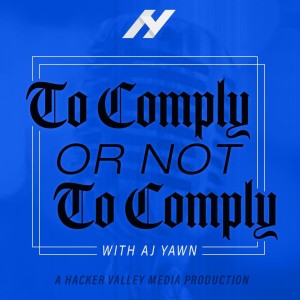
Monday Jul 25, 2022
Approachable Empathetic People Leaders with Andrew Alaniz
Andrew Alaniz, Director of Technology & Risk at Freddie Mac, joins me on a journey through the essentials of cybersecurity leadership. With years of experience in the industry, I picked Andrew’s brain on what leadership really looks like, and how it differs from being a manager. Focusing on empathy and understanding for the people we lead, Andrew explains how to earn trust from the people around you, inspire collaboration between employees in remote work settings, and create safe spaces where no one has to leave “life” at the office door.
Timecoded Guide:
[00:00] Connecting with the people behind cyber technology
[05:22] Starting a cyber career with less barriers to entry
[14:35] Building empathy and earning trust as a leader
[21:52] Cyber career burnout and employee safe spaces
[31:59] Actions speaking louder than words when leading employees
What is the importance of empathy in leadership?
Many people want to be a better leader in their workplace, but Andrew understands that a true leader leads with empathy. Real leadership cannot be earned from a place of selfishness and real trust can’t be bought. Understanding others, caring about their lives, and opening yourself up to be a safe space builds the foundation of trust and empathy between you and the people you’re leading. There is no “hack” to better leadership or a stronger team performance. Better performances are born from knowing your team and caring about them as employees and as people, with rich lives inside and outside of work.
“I think that empathy is maybe the utmost requirement for an effective leader. You can take trust, you can buy trust, and you can earn trust. The only way trust is sustainable is if it's earned, and empathy is really essential to that.”
When people think about work-life balance, especially in cyber, what does that mean?
The concept of work-life balance has become a daily conversation for leaders around the world, and Andrew encourages us to rethink what we may see as a balance. While everyone deserves a life outside of work, life doesn’t end when you’ve stepped inside an office or logged onto your computer for the day. A balance needs to happen and life outside of work has to be respected, but employees shouldn’t feel afraid to be open about their lives during the workday. Instead, everyone on your team should feel empowered and respected to do their jobs without carrying the baggage of work home with them, or feeling the stress of not being able to share their lives with their coworkers when they’re at the office.
“[Leaders have to] empower our teams to feel safe about that work-life balance. I think that's important. There's a lot of places where there's a fear of, ‘I've got to keep life separate,’ but the reality is, you can't.”
Do you think it's on the leaders to have visibility into their employees’ lives and to help manage burnout?
Everyone in cyber fears losing an employee or even their own job success to burnout. However, career burnout is preventable and Andrew wants leaders to know that they can help prevent it. We didn’t get to the staffing gap we’re in today without leaders and managers pushing employees too hard for too long. Taking us back to the concept of empathy, Andrew explains that he wants his people to feel empowered and encouraged to do what they need to do to thrive at work. Adopting a “Yes, but” approach helps Andrew and his team acknowledge that there are sacrifices that have to be made in order to take on more projects without ruining work boundaries or causing employee burnout.
“Customer service is one of my top priorities. Quality is my second priority, but we're going to be a culture of ‘Yes, but.’ ‘Yes, but,’ is the idea that, yes, I can absolutely get to that, but right now it's going to take me two weeks to get to it, or whatever that may be.”
Where do you sit in the debate between remote work and the return to offices?
Remote cybersecurity positions increased tenfold during the COVID-19 pandemic, but many employees are now seeking a return to the office or a hybrid working position for their employees. Considering he’s a director himself, I was curious as to how Andrew views security professionals working remotely. According to Andrew, we don’t have to head back to the office yet (or ever) if we don’t want to, but we do have to encourage remote collaboration and personal connection between our employees and ourselves. Taking advantage of Zoom, Teams, and chat channels like Slack from a less professional standpoint might open up the opportunity for employees to talk just like they would in an office— sometimes about work, but other times about life, events, or new ideas.
“There's a difference between remote work and remote collaboration. A lot of companies have remote work down, but remote collaboration is completely different. People accidentally collaborated constantly in the office.”
---------
Links:
Keep up with our guest, Andrew Alaniz, on LinkedIn.
Connect with AJ Yawn on LinkedIn and Twitter
Follow ByteChek on LinkedIn and Twitter, or learn more about ByteChek on their website
Listen to more from the Hacker Valley Studio and To Comply or Not to Comply